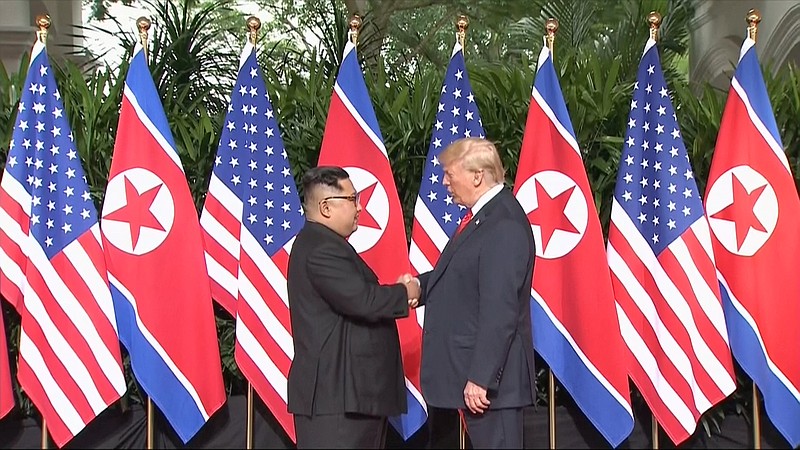We've been here before, with crossed fingers, at the precipice of peace on the Korean peninsula.
We're here for the first time with the presence of a sitting American president but with the same promises of denuclearization and a new way forward from a North Korean dictator.
We, a peace-loving people, were disappointed when peace didn't occur in the 1990s and again in the 2000s. So we stand on the precipice again, with fingers crossed.
Though we Americans are an optimistic lot, we worry that Lucy will - for a third time - pull the football away when an enthusiastic Charlie Brown comes running up to kick it.
The principals are different this time, though. Maybe that will make a difference.
Kim Jong Un is a third-generation leader of a country in many ways stuck in the 20th century. Though his people often go hungry, he uses his military and the threat of power to remain relevant on the northern part of a peninsula while the occupants of the southern end are fully engaged in the present. The pressure for his country to join the 21st century must be palpable.
United States President Donald Trump is a man used to playing hardball in the business world and making deals to get what he - and now his country - wants. Where previous administrations approached denuclearization talks almost as supplicants, he drew near with warnings, the willingness to walk away (which he did once) and the desire to get what he came for.
What came from Monday's summit in Singapore between the two men, though, are only promises. North Korea will work toward dismantling its nuclear program, with the destroying of a "major" testing site its good faith effort. Meanwhile, the United States will commit to providing "security guarantees" to the country, with its freezing of military exercises with South Korea its good faith pledge.
The devil will be in the details and the timing.
The summit done, denuclearization talks will continue with U.S. Secretary of State Mike Pompeo and a North Korean official of similar status. However, it is action that will determine the fate of the historic summit.
Will the missile site be destroyed? Will the military exercises be discontinued? Will negotiations and follow-up continue in a timely fashion?
And can the U.S. verify whatever Kim's regime says it will do?
Trump rightly says we must.
"We're going to have to check it," he said. "We will check it. Total and complete."
That's all down the road. No one who knows the Kim family's history with denuclearization promises or Trump's volatility should bet it's a done deal.
If it is, no one will have to pat the president on the back. He'll do it himself, and he'll deserve whatever fawning comes his way.
In the meantime, Trump's critics are so afraid a door to peace might have been cracked open that they're speaking words they would have never given voice to had someone else been in his position.
U.S. House Minority Leader Nancy Pelosi, who would have praised any Obama-era opening in North Korea as monumental, initially could only criticize the U.S. and North Korea leaders for being together. In time, she said only "vague promises" were given "in [the president's] haste" to reach agreement.
Others - the same ones who praised the former president for bowing to foreign despots - didn't like the kind words the current president said about Kim or complained that holding a summit with the dictator was legitimizing him.
That they would eschew the first prospect for peace with the country in more than a decade to pile hate on Trump is embarrassing but telling about the American left.
And never mind that the president said giving up the joint military exercises would occur only if the North Korean leader lived up to his promises and could resume at any time if "future negotiation is not going along like it should." He also said economic sanctions would stay in place until "the menace of nuclear weapons" is removed, and that no soldiers will be removed from South Korea, despite the fact "I want to bring our soldiers back home."
For Kim, their brief moment on the precipice meant sharing the stage with a world leader. For Trump, it again meant going where others have dared not go.
In the end, it may be nothing. But what if it's not?
